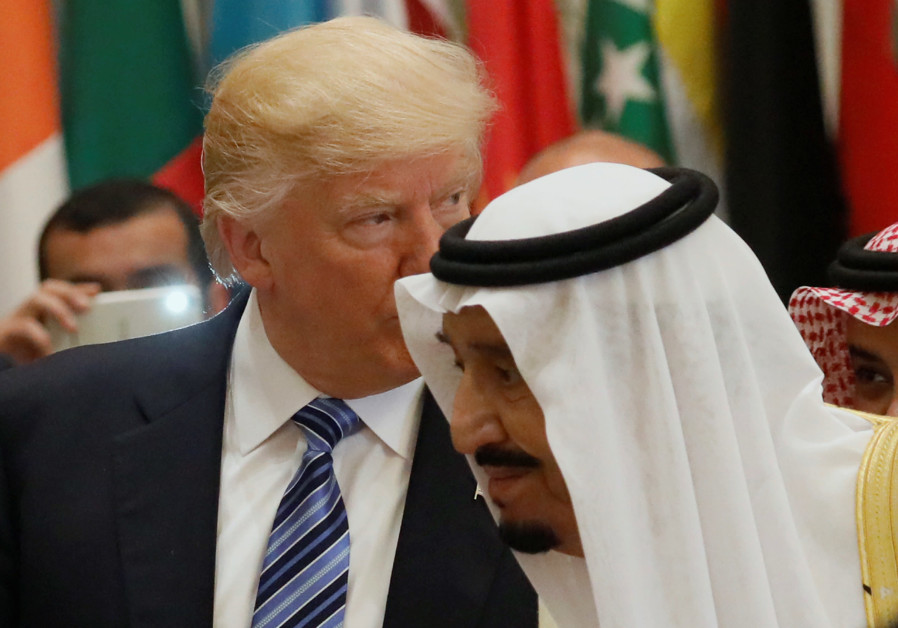After US President Donald Trump spoke to Saudi Arabia Crown Prince Mohammed Bin Salman, US Secretary of State Mike Pompeo said there was “no evidence” the large attack came from Yemen.
US President Donald Trump and Saudi Arabia’s King Salman bin Abdulaziz Al Saud (R) attend the Arab Islamic American Summit in Riyadh, Saudi Arabia May 21, 2017.. (photo credit: REUTERS/JONATHAN ERNST)
Less than twenty-four hours after a major attack by at least ten drones or cruise missiles on key Saudi oil facilities, the rhetoric in the Middle East is heating up and the region appears on the brink of conflict. After US President Donald Trump spoke to Saudi Arabia Crown Prince Mohammed Bin Salman, US Secretary of State Mike Pompeo said there was “no evidence” the large attack came from Yemen.
This now means that Saudi Arabia, which is investigating how the attack happened, is positioned to defend itself, but must choose wisely how. Saudi Arabia’s oil production and exports have been disrupted. The facility at Abqaiq, which was struck, is one of the world’s largest processing facilities. According to Reuters the attacks have impacted 5 million barrels per day.
Pompeo says that Iran has been behind 100 attacks on Saudi Arabia. “Iran has now launched an unprecedented attack on the world’s energy supply.” Originally the Houthi rebels appeared to take credit for the attack, which was some 1,200 km away from Yemen. This was improbably as there is little evidence that their drones or cruise missiles can fly that far. It now appears the attack on Saudi Arabia came from somewhere else. In May a similar long-range attack was said to have come from Iraq. That Pompeo said there was no evidence the September 14 attack on Abqaiq came from Yemen appears to mean the US has evidence it came from somewhere else. Otherwise how could he rule out the Houthis?
The US has strongly condemned the attack. It sees the oil facility as essential to the global economy. The context here is that since May Iran has been accused of striking at oil tankers in the Gulf to show that if the US sanctions continue what Iran says is economic war against it, then others will suffer as well. A rising chorus of voices are not pointing to Iran as the major culprit. US Senator Lindsey Graham even says it is now time for the US to put on the table an attack on Iranian oil refineries. He has an “if” in that argument though. “If they continue their provocations.” There is a threat to Saudi Arabia and other US Gulf allies now.
Iranian media, such as Fars News, appear to be celebrating the attack through major headlines. An attack at the “heart” of Saudi oil, these media say. UAE Minister of Foreign Affairs Anwar Gargash has pledged deep support for Saudi Arabia.
In the past Riyadh has called on regional states to support it, such as after a May 14 drone strike in Saudi Arabia. But this one is more serious and has major ramifications. US bases in Bahrain were just 100 km from the attack. It’s clear what happened for anyone looking at radar signatures of the drones or cruise missiles. The evidence will likely come in the next days, with coordinated US-Saudi discussions and discussions between Riyadh and its Gulf allies. An escalation has already happened but Riyadh and the US must weigh what a response could mean across the Gulf and in neighboring countries such as Iraq and Yemen.
With many arguing that US-Iran tensions might be reduced with National Security Advisor John Bolton’s exit, it appears Tehran just handed the US a big decision-making question mark, and the Saudis will be in the driver’s seat to manage the crises. It is a crises that has developed and percolated for years, but particularly since May when the US warns of emerging threats. At Abqaiq the threat emerged. But most of those astride the Gulf don’t want a conflict. Trump was been reticent as well, eschewing airstrikes in June after a US drone was shot down. Yemen has been an easier proxy war. But Abqaiq is not Abha and Jizan, it is a major strategic asset. Even though it was threatened in the past by terror attacks, this appears to be wholly new in the sophistication of the drone or missile technology used.




It appears Iranian cruise missiles attacked Saudi Arabia not Houti drones.
So is Trump serious? Has he thought out what he tweeted?
So maybe two good things will happen:
1. Iran gets sliced and diced militarily
2. My Chevron Stock will go through the roof.